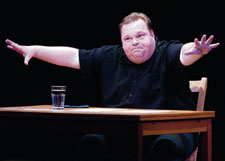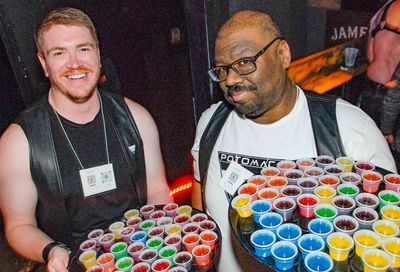Noises On
Mike Daisey takes sharp aim at the institution of theater and turns it into a provocative piece of, well... theater
Sitting in the Woolly Mammoth Theatre audience for Mike Daisey’s one-man show, How Theater Failed America, you may find yourself wondering, ”Is Mike Daisey talking about me-” And not in a good way.

Mike Daisey: ‘How Theater Failed America’
(Photo by Kenneth Aaron)
To be fair, this is probably not a thought that will occur to your average audience member. This is a special meditation for the actors in the audience and the artistic directors and drama majors and, yes, the critics. Oh, and the development officers and the theater-subscription sales team. And any number of donors.
But regular audience members, you’re safe. You’ll be able to sit back in that beautiful darkened theater and feel ever-so-slightly satisfied that you seem to be the only person in the room who is not failing America by contributing to the perpetuation of the theater-industrial complex.
On the other hand, you did purchase that ticket and you are sitting in that donor-purchased seat. So while not directly contributing to the downfall of arts in the country, you are encouraging those of us who do so, truth be told, Daisey may well be talking about you, too. And not in a good way.
Daisey is one of those men whose personality takes up all the air in a room by sheer force of his presence. He’s a performer with the kind of mad creativity that allows him to transform a pile of notes written on the plainest of yellow legal paper into an arresting and provocative piece of theater. (This is, after all, a man who brought the life of Nikola Tesla — a real-life scientist who had both an island lair and a death ray — to the stage in his work Great Men of Genius.) He’s an artist with the guts to ask, out loud, whether or not the emperor is wearing any clothes even while he’s marching in the procession. How Theater Failed America is a performance piece that falls somewhere between public address and academic lecture. It puts a cultural institution on the couch and in the spotlight.
Is theater doing what theater should be doing- Has the art form lost its way in a desire to be profitable and comfortable- How long before some artistic director figures out how to save money by successfully mounting a production with no actors- Consider that the next time you’re looking for a ”Fair Trade” label on your coffee. Where’s the ”Fair Wage” logo on your theater program-
And, how is it that this entire system continues to operate-
It’s the last question that is most intriguing and the one that Daisey’s mix of cultural observation and stories from his life in theater brings most sharply into focus. Actors devote their time, energy and talents to the pursuit of a career that is even more uncertain than that of an auto worker or, frankly, journalist. Those who are lucky enough are periodically dropped into a rehearsal room or empty warehouse space and asked to become Othello or Ophelia or the Happy Duck by the end of the following week.
To Jan. 18
Woolly Mammoth
641 D St. NW
$25
202-393-3939
woollymammoth.net
And more often than not, they do.
The show opens, the audience comes or they stay home and watch Desperate Housewives, the critics love it or hate it or pass it along to someone else so that they don’t have to truck out to that warehouse theater in the middle of nowhere again, and the press people and development folks crowd around the reviews to figure out what to cut-and-paste to grab the attention of donors and advertisers. Then, the show closes and a new cast starts the process all over again.
This is the thinking that How Theater Failed America inspires. It’s not the kind of show that will lead you to exit the theater rhapsodizing on Daisey’s use of language (which includes such gems as his description of an artistic director as ”a hyperactive badger as written by Mamet”), insider theater jokes (”They’re like the fucking Wooster Group”) or cautious optimism (along with turning off cell phones, audience members are asked to please ”not throw anything at Mike Daisey until after the performance”). Instead, it’s the kind of show that leaves you with more questions to ask than answers to give.
Questions like, ”Was Mike Daisey talking about me?”
Support Metro Weekly’s Journalism
These are challenging times for news organizations. And yet it’s crucial we stay active and provide vital resources and information to both our local readers and the world. So won’t you please take a moment and consider supporting Metro Weekly with a membership? For as little as $5 a month, you can help ensure Metro Weekly magazine and MetroWeekly.com remain free, viable resources as we provide the best, most diverse, culturally-resonant LGBTQ coverage in both the D.C. region and around the world. Memberships come with exclusive perks and discounts, your own personal digital delivery of each week’s magazine (and an archive), access to our Member's Lounge when it launches this fall, and exclusive members-only items like Metro Weekly Membership Mugs and Tote Bags! Check out all our membership levels here and please join us today!






















